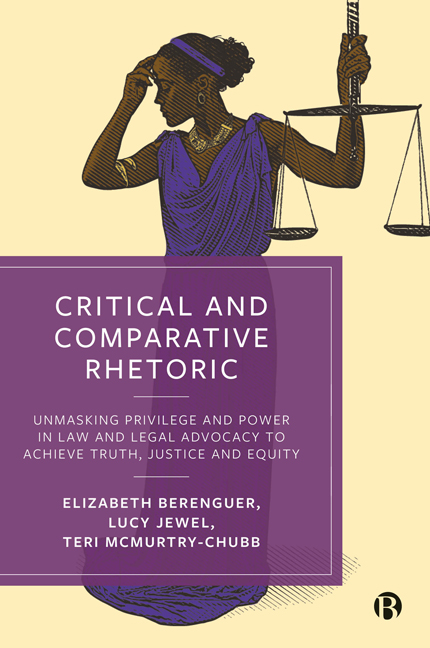 Critical and Comparative Rhetoric
Critical and Comparative Rhetoric Book contents
- Frontmatter
- Contents
- Detailed Contents
- List of Figures and Tables
- About the Authors
- Introduction
- 1 What’s Wrong with Aristotle?
- 2 Problematizing Aristotle: Renovating and Remodeling Traditional Legal Rhetoric
- 3 Shifting the Focus from the West
- 4 Multicultural Rhetorics
- 5 Reproducing the Canon, Reproducing Inequity (Traditional Rhetoric)
- 6 Interrupting the Canon
- 7 Disrupting the Canon: Multicultural Rhetorical Strategies in Action
- References
- Index
3 - Shifting the Focus from the West
Published online by Cambridge University Press: 18 January 2024
- Frontmatter
- Contents
- Detailed Contents
- List of Figures and Tables
- About the Authors
- Introduction
- 1 What’s Wrong with Aristotle?
- 2 Problematizing Aristotle: Renovating and Remodeling Traditional Legal Rhetoric
- 3 Shifting the Focus from the West
- 4 Multicultural Rhetorics
- 5 Reproducing the Canon, Reproducing Inequity (Traditional Rhetoric)
- 6 Interrupting the Canon
- 7 Disrupting the Canon: Multicultural Rhetorical Strategies in Action
- References
- Index
Summary
Contested terrain: challenging foundational narratives
The idea of the West, in theory and in practice, has shaped the way American law is practiced and judicial opinions are written. As discussed in Chapter 1, the context for American law and jurisprudence is the nomos, or the universe in which law functions. The nomos operates invisibly to deploy Western European ways of knowing (epistemology) and ways of being (ontology) through the reasoning and analytic processes that create and recreate the body of law. As an import to the United States, Western European epistemologies and ontologies manifest as the imperialist, capitalist, White supremacist blueprint for the U.S. and its legal system. The collective, social memory of the U.S., the active past that forms our identities and projects our group identity to the world, is a narrative of a country that begins with the arrival of White European immigrants seeking refuge from religious persecution. As expressed in the report commissioned by the 45th presidential administration (2016– 20) about the nation's political founding in 1776:
[B] y the time of the American founding, political life in the West had undergone two momentous changes. The first was the sundering of civil from religious law with the advent and widespread adoption of Christianity. The second momentous change was the emergence of multiple denominations within Christianity that undid Christian unity and in turn greatly undermined political unity. Religious differences became sources of political conflict and war [and] it was in response to these fundamentally new circumstances that the American founders developed the principle of religious liberty.
While the founders’ principles are both true and eternal, they cannot be understood without also understanding that they were formulated by practical men to solve real-world problems. For the founders’ solution to these problems we must turn to the Constitution [of the United States of America].
The preamble to the Constitution establishes it as a document written by “we the people, in order to form a more perfect union, establish justice, insure domestic tranquility, provide for the common defense, promote the general welfare, and secure the blessings of liberty to ourselves and our posterity.”
- Type
- Chapter
- Information
- Critical and Comparative RhetoricUnmasking Privilege and Power in Law and Legal Advocacy to Achieve Truth, Justice, and Equity, pp. 66 - 95Publisher: Bristol University PressPrint publication year: 2023


